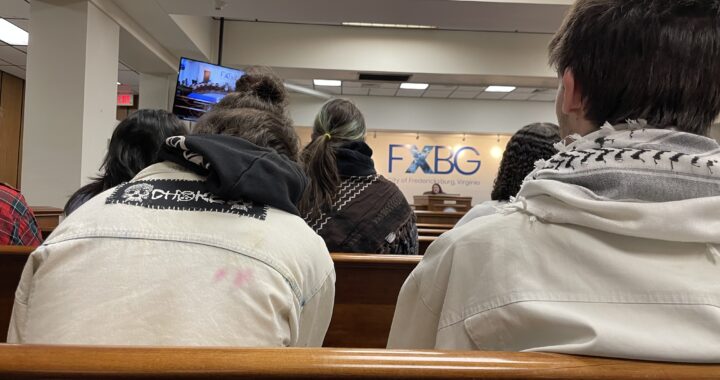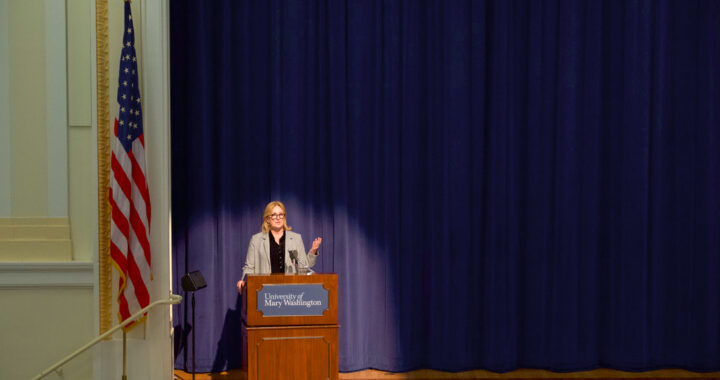Students Scrounge on $2 a Day
3 min readBy Melanie Walter
This week you might be aware of some rather unusual goings on as you trudge across campus to your morning class or climb the stairs to Seacobeck for lunch. People you’re accustomed to seeing in the dorm, clean, friendly, and well fed, are grimy, begging for leftovers and milling about in a vast shanty town located in Ball Circle.
What, you might ask, could possibly inspire a group of college students to live like this?
Well, The Economic Development Club’s $2 Challenge is back again!
Approximately 30 UMW students are simulating life in abject poverty in hopes of drawing awareness to the challenges confronting more than half of the world’s population each day. For the duration of the week, participants must contrive to purchase or scavenge the essentials: food, water, school supplies, toiletries, and other amenities, staying within a $2 per day income.
The challenge requires participants to boil water before consuming it and use electronic devices only during daylight hours in order to better mimic the standard of living, and resources available in poor countries where uncontaminated water and electricity cannot be taken for granted.
By attempting to live as the world’s poor do, participants hope to gain some insight into their plight and motivate activism among their peers, becoming a force for positive change.
This year, Professor Humphrey’s Economic Development Class and the $2 Challenge are partnering with Students Helping Honduras. Together, these groups seek to meet a $5,000 fundraising goal. All proceeds from the challenge will be used to implement the La Ceiba Microfinancial Institution (MFI) in Siete de Abril, and Soleada Honduras.
If the fundraising goal is met, La Ceiba will be able to implement training programs that will provide borrowers with the necessary business skills to operate a profitable firm. Also, using the challenge money, Dr. Humphrey intends for La Ceiba to issue its first 15 microfinance loans in January of next year.
Microfinance was first introduced by Nobel Prize winner Mohamed Yunus in the 1970s. Today, it is widely considered the best means of stimulating economic development in underdeveloped nations. It enables the people of developing nations to assume responsibility for their own future, rather than providing them with temporary assistance in the form of grants or hand-outs. While it has proved effective throughout the developing world, over 70% of micro-credit is issued in Asia. La Ceiba will provide valuable financial services to entrepreneurs in Latin America, a region that has received little attention in the microfinance movement thus far. Local entrepreneurs will be able to apply for $50-$100 loans and participate in savings programs. Access to these resources will enable them to start small businesses, elevating their own standard of living and providing the impetus for sustainable long-run economic growth.
As the challenge draws to a close, the Economic Development Club is asking the university community to help them reach their $5,000 goal. They invite students, faculty, and staff to participate in any way they can and offer several suggestions.
Starting next week, students can take the challenge, constrain your daily income to $2 a day for as many days as you desire, and donate the difference between what you would have spent and your $2 a day income to the Two Dollar Challenge.
Students can donate securely on-line. All donations go to Students Helping Honduras and are tax deductible. A student can also sponsor a Two Dollar Challenge participant.
Through this challenge, students are asked to spread the word about global poverty and pass along our homepage (twodollarchallenge.org) to friends, family members, local organizations, and places of worship.
For this one week in April, participants in the $2 Challenge are hungry, thirsty, and constantly fatigued. At the end of the week, the students will return to their dorm room, take a hot shower, and have a glass of clean water. Impoverished families will not. Please keep that in mind, even as you laugh at the absurdity of the students’ behavior or barter with them for a pair of clean socks. Hopefully our university will come together, and help Hondurans take the first step toward sustainable economic growth.











